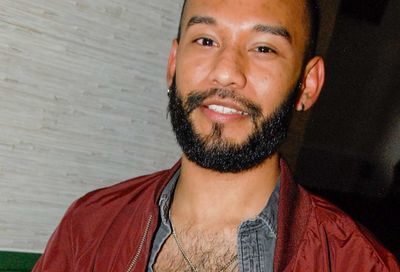U.S. Army’s First Trans Officer Indicted for Spying for Russia
Maj. Jamie Lee Henry and her wife are accused of conspiring to hand over the private medical information of Army personnel and their families.

A U.S. military doctor who claimed to be the first-known active duty Army officer to come out as transgender in 2015 has been indicted for allegedly attempting to pass sensitive medical information about military service members to a person she believed to be working for the Russian government.
Maj. Jamie Lee Henry, 39, a staff internist at Fort Bragg, North Carolina, who held secret-level security clearance, was federally indicted in Maryland on Sept. 28 after meeting with an undercover FBI agent who posed as a Russian embassy employee. Indicted along with Henry was her spouse, Dr. Anna Gabrielian, an anesthesiologist and professor at Johns Hopkins University.
According to a press release from the U.S. Department of Justice, Gabrielian and Henry face eight charges of conspiracy and wrongful disclosure of “individually identifiable health information” for attempting to provide confidential health information of Americans associated with the U.S. government and military to Russia.
In the indictment, filed in federal court on Wednesday, Gabrielian and Henry conspired to provide information related to patients at Johns Hopkins and Fort Bragg to an undercover FBI agent posing as an embassy employee.
Prosecutors claim they did so in order to demonstrate the level of access they had to confidential medical information, their willingness to provide that information to the Russian government, and the potential for the Russian government to exploit that information for its own purposes during its ongoing illegal invasion of Ukraine.
The couple, who reside in Rockville, Maryland, met with the undercover agent on August 17, 2022 at a hotel in Baltimore City.
During that meeting, Gabrielian told the agent she was motivated by patriotism toward Russia to provide any assistance she could, even if it meant being fired or going to jail.
She proposed potential cover stories for meeting with the agent, stressing the need for “plausible deniability” in case she was confronted by law enforcement about her meetings with the undercover agent.
She also claimed that her spouse, as an Army officer, could serve as a better asset for Russia, potentially providing information on how the U.S. military establishes an army hospital in war conditions, and about previous training the U.S. military provided to Ukrainian military personnel.
She arranged for Henry to meet with the agent later that evening, which Henry did. During that second meeting, Henry explained that she was committed to assisting Russia, and had looked into volunteering to join the Russian Army after Russia invaded Ukraine, but said Russia was looking for people with combat experience, which Henry lacked.
Henry — who is referred to as he/him in the indictment despite using she/her pronouns in an interview with BuzzFeed in 2015 — reportedly told the undercover agent: “The way I am viewing what is going on in Ukraine now, is that the United States is using Ukrainians as a proxy for their own hatred toward Russia.”
Gabrielian and Henry offered to provide the agent with private medical records from the U.S. Army and Johns Hopkins in order to help Russia. Gabrielian also reportedly demanded that if she were put at significant risk of arrest, she wanted her and Henry’s children to “have a nice flight to Turkey to go on vacation because I don’t want to end in jail here with my kids being hostages over my head.”
Henry expressed concerns about passing a background check for her security clearance, telling the agent, “I don’t want to know your name … because I want plausible deniability too.” She also said: “My point of view is until the United States actually declares war against Russia, I’m able to help as much as I want. At that point. I’ll have some ethical issues I have to work through,” to which Gabrielian replied, “You’ll work through those ethical issues.”
A week later, Gabrielian met with the undercover agent at the hotel in Baltimore, stating that although Henry was a “coward” and concerned about violating HIPAA by providing personal medical records to the agent, she had no such concerns and violated HIPAA “all the time.” She promised to check with Henry about obtaining medical records from patients at Fort Bragg. The next day, Gabrielian sent a text to the agent, using coded language, to say that Henry had agreed to hand over Army medical records.
On August 31, Gabrielian and Henry allegedly met the undercover agent at the hotel room in Gaithersburg, Maryland, where Gabrielian handed over health information related to two individuals, includign the spouse of an employee of the Office of Naval Intelligence, whom Gabrielian pointed out had a medical condition Russia could “exploit.” Henry also allegedly provided health information about five people who were either military veterans or related to military veterans.
Henry, a transgender woman, told BuzzFeed in that 2015 interview that, to their knowledge, they were the first active duty Army member to change their name and gender.
Henry and Gabrielian were both scheduled to appear in federal court in Baltimore on Thursday.
If convicted, each faces a maximum sentence of five years in federal prison for conspiracy, and a maximum of 10 years for each count of disclosing confidential health information — although the Justice Department noted, in its press release, that sentences for federal crimes are typically less than the maximum penalties.
When asked for comment, a spokesman for the Army told the Army Times that Henry is currently assigned to Fort Bragg, with a rank of major, but declined to give further comment, adding only that Henry entered active-duty service in May 2007 and has no combat deployments.
A spokesperson for Johns Hopkins told NBC News in a statement: “We were shocked to learn about this news this morning and intend to fully cooperate with investigators.”
Support Metro Weekly’s Journalism
These are challenging times for news organizations. And yet it’s crucial we stay active and provide vital resources and information to both our local readers and the world. So won’t you please take a moment and consider supporting Metro Weekly with a membership? For as little as $5 a month, you can help ensure Metro Weekly magazine and MetroWeekly.com remain free, viable resources as we provide the best, most diverse, culturally-resonant LGBTQ coverage in both the D.C. region and around the world. Memberships come with exclusive perks and discounts, your own personal digital delivery of each week’s magazine (and an archive), access to our Member's Lounge when it launches this fall, and exclusive members-only items like Metro Weekly Membership Mugs and Tote Bags! Check out all our membership levels here and please join us today!






















